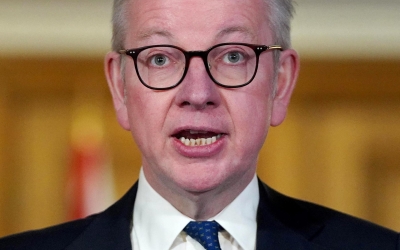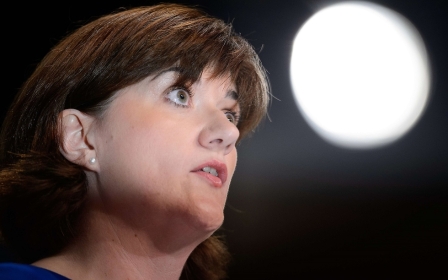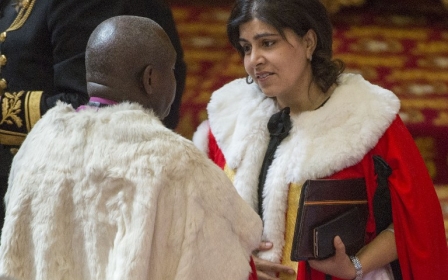Trojan Horse affair: Muslim Council of Britain calls for independent inquiry

The Muslim Council of Britain (MCB) called for an independent public inquiry into the Birmingham Trojan Horse affair on Thursday, following fresh revelations about the case in a recent New York Times podcast.
The Trojan Horse scandal centred on an anonymous letter leaked to the media in 2014 that allegedly detailed a step-by-step "Muslim plot” to take over schools in the UK and impose an extreme version of Islam.
British media was sent into a frenzy and perpetuated the idea that the letter was legitimate.
The podcast series, The Trojan Horse Affair, which was launched in February by Serial Productions and the New York Times, follows journalists Brian Reed and Hamza Syed as they set out to identify the author of the anonymous letter that shaped the government’s counter-extremism policy.
The MCB warned authorities at the time to not be “sidetracked by culture wars initiated by divisive commentators”. It rejected the findings of a government report on the issue.
New MEE newsletter: Jerusalem Dispatch
Sign up to get the latest insights and analysis on Israel-Palestine, alongside Turkey Unpacked and other MEE newsletters
“This podcast reveals the deep-rooted nature of institutional Islamophobia in the UK. Each episode is a damning indictment of how narratives and tropes were perpetuated to feed a story of moral panic, in which Muslims are centre stage,” Zara Mohammed, secretary general of the MCB, said on Thursday.
“We call for an independent public inquiry into the Trojan Horse case, and a public apology from those who ignored the truths presented to them,” added Mohammed.
Commenting on new details uncovered by the series, John Holmwood, an expert witness in professional misconduct hearings brought against teachers caught up in the affair and the co-author of a seminal book examining the Trojan Horse hoax, also called for a new inquiry into how officials in Birmingham and London had handled the case.
"In the interest of teachers falsely accused of misconduct and of a community falsely accused of 'un-British' values, there must be an urgent inquiry into the handling of the matter by the Department for Education and Birmingham City Council," Holmwood told Middle East Eye.
Shaping government counter-terrorism policy
The Trojan Horse letter was sent anonymously to the head of Birmingham City Council in November 2013 and made national headlines for months after being leaked to journalists in early 2014.
The four-page document appeared to outline plans, dubbed “Operation Trojan Horse”, for the takeover and running of schools according to conservative Islamic principles in predominantly Muslim areas of Birmingham.
The opening and closing pages, along with the names of the people writing and receiving the letter, are missing. Neither the author of the letter, nor the person who sent the letter to Birmingham City Council, have ever been identified.
The letter describes tactics such as exerting influence through school governing bodies and stirring up complaints by “Salafi parents” and staff in order to undermine and force out headteachers, and names schools as examples where these tactics are purported to have been successful.
After details of the letter were leaked to the media, both Birmingham City Council and the Department for Education launched investigations into the alleged plot.
Neither investigation was tasked with identifying the author of the letter or establishing whether it was genuine.
Sir Ian Kershaw from Birmingham City Council said in his report that he found “no evidence of a conspiracy to promote an anti-British agenda, violent extremism or radicalisation in schools”.
According to the podcast, officials and police had by then determined that the letter was a hoax. It cites notes obtained by the reporters, which were taken by a Birmingham City Council official at a meeting in February 2014 with then-Secretary of Education Michael Gove.
“The police recommendation including the counterterrorism unit is that the letter was bogus,” the notes said.
“There is a serious credibility gap. The document contains serious factual inaccuracies and, in a number of areas, contradictions.”
The Trojan Horse affair had a significant impact on government counter-terrorism policy. It was cited as evidence of “extremism in our institutions” when the Home Office rolled out an updated counter-extremism strategy in 2015.
In the same year, the Home Office introduced the Prevent Duty - a statutory duty placed on teachers and other public sector workers to “have due regard to the need to prevent people from being drawn into terrorism” - which has been criticised by rights groups as discriminatory against Muslims.
“The truth now needs to come out," said MCB’s Mohammed. "Who was behind this hoax? Why did decision-makers dismiss crucial evidence presented at every turn? We know who the victims of this hoax were, but who were the beneficiaries?"
Middle East Eye delivers independent and unrivalled coverage and analysis of the Middle East, North Africa and beyond. To learn more about republishing this content and the associated fees, please fill out this form. More about MEE can be found here.






